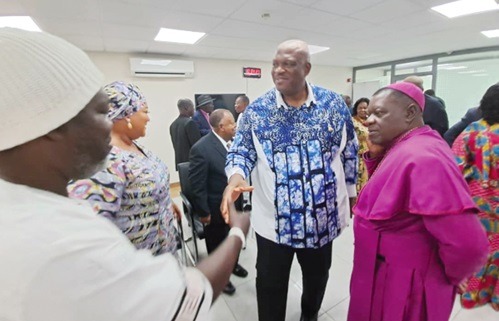The Electoral Commission (EC), political parties, security agencies and other key actors in the political space have been urged to prioritise the national interest by playing their respective roles without fear or favour to ensure a peaceful election on December 7, this year.
The Minister of the Interior, Henry Quartey, who made the call, stressed that the actions and inactions of the key players in the electoral process had the potential to either promote peace or plunge the country into insecurity.
Additionally, Mr Quartey said it was when the various stakeholders shelved their parochial interests and ensured that laid down procedures worked well that the electoral process would be peaceful.
“All of us must strive to put Ghana first and make a conscious effort at making the electoral process one of integrity so that we can make our country better than we came to meet it,” he said.
NPC meeting
Mr Quartey made the call at a national planning retreat organised by the National Peace Council (NPC) in Accra yesterday to strategise towards a peaceful election. The meeting, which brought together all the 16 regional chairmen of the NPC, formed part of the council’s strategy to engage more with all stakeholders so as to identify and deal with potential triggers of electoral violence before they escalate.
Key personalities at the meeting included the Chairman of the NPC Board, Rev. Dr Ernest Adu-Gyamfi; the Head of the Ahmadiyya Muslim Mission, Maulvi Mohammed Bin Salih; a constitutional expert and statesman, Dr Nana S. K. B Asante; and a member of the NPC Board, Rt Rev. Col. John Kwamina Otoo.
The move by the NPC is also meant to build consensus among stakeholders to help strengthen mechanisms for cohesion, political tolerance, peace-building and national integration.
NPC commended
Mr Quartey commended the NPC for its crucial role in maintaining the peace of the country, particularly in the wake of threats of terrorism and violent extremism, chieftaincy and political conflicts.
In particular, the Interior Minister lauded the council for the good work done to bring the National Democratic Congress (NDC) back to the Inter-party Advisory Committee (IPAC) meetings, saying the development would promote fairness and unity ahead of the elections.
The minister described as refreshing the decision by the NPC to strategise for peace ahead of the December 7 elections.
He urged the members of the council to approach their work with tact and dexterity in order to make the desired impact. “In your quest to realise your mandate in this difficult time we find ourselves in, things would have to be done differently if we want to get the required results.
Let’s fashion out our activities according to law, policy and administrative regulations to ensure no board member or staff is left out in your quest to seek the total peace of Ghana,” Mr Quartey entreated the council members.
Inter-party dialogue
For his part, Rev. Dr Adu-Gyamfi said the NPC had created an inter-party dialogue platform for all political parties to meet with the council to identify and address teething challenges that could affect the elections.
He said the NPC would meet the political parties quarterly to discuss and iron out any concerns that could affect the elections. The NPC Chairman urged all members of the council to remain unflinching in the discharge of responsibilities even in the midst of unwavering challenges.
“Despite the challenges, stress, discouragement and insults that have characterised our work, I would like to encourage you to stay focused in ensuring that the mandate of the NPC is executed without any hindrance,” Rev. Dr Adu-Gyamfi said.
He further stressed that it was important for the NPC to do everything possible to live up to its mandate of facilitating and developing mechanisms for conflict prevention, management, and resolution as well as building sustainable peace in the country.
Dr Adu-Gyamfi added that the NPC’s role in this year’s elections could not be overemphasised given that it would test the resilience of the country’s democracy. “Let us sustain the spirit of teamwork by sharing ideas, notes, and information from our regions especially our success stories to enrich our collective effort,” he said.
Background
The NPC was established by the National Peace Council Act, 2011 (Act 818) with the mandate to promote peace in the country. The NPC has a 13-member governing board comprising eight representatives from faith-based organisations (FBOs); two persons nominated by the President; two other persons nominated by identifiable groups; and one representative of the National House of Chiefs.
The FBOs who have representation on the NPC board are the Christian Council of Ghana, Catholic Bishops Conference, Ghana Pentecostal and Charismatic Council, and National Council for Christian and Charismatic Churches.
The rest are Ahamadiyya Muslim Mission, Al-Sunnah Muslims, Tijaaniya Muslim Group and the Practitioners of African Traditional Region.


